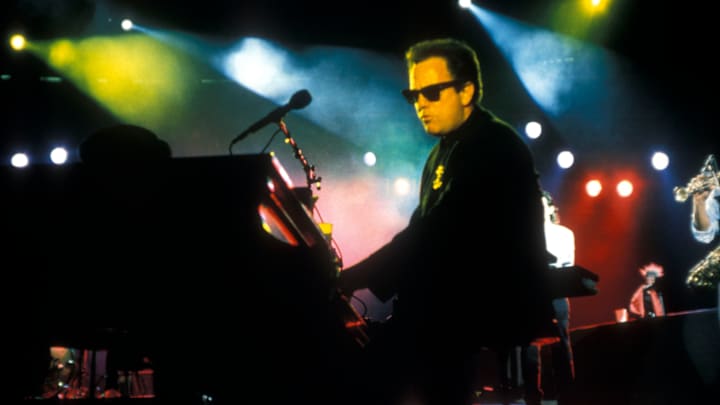
Verse 3 (Early to Mid 50s)
Joseph Stalin
Joseph Stalin was the leader of the Soviet Union from 1924 until his death in 1953, and he was possibly the most significant leader of WWII, as Stalin's Russia was instrumental in the Allies' WW2 victory. Before his death, Stalin consolidated his power to become a dictator, and initiated the "grand purge," in which over a million "enemies of the working class" were imprisoned in gulags, and around 700,000 were executed.
Malenkov
After Stalin, Georgy Malenkov took over as the head of the Soviet Union. However, he only lasted nine days in the role before being forced out and accepting the role of premier instead, due to a power struggle with Nikita Khrushchev.
Nasser
Gamal Abdel Nasser was the second president of Egypt from 1954 to his death in 1970, though he was not formally elected until 1956. Nasser raised the heckles of the West, due to his support for Algerian independence, his policy of Cold War neutrality, and his recognition of communist China. What he's remembered most for is the Suez Crisis, in which his nationalization of the Suez Canal provoked a war with the UK, France, and Israel, known as the Suez Crisis.
and Prokofiev
Another mention that heralds a death, Sergei Prokofiev was a Soviet composer and pianist who passed away in 1953.
Rockefeller
The Rockefeller family own one of the world's largest family fortunes, starting with John D. Rockefeller, who was the wealthiest American of all time after founding the Standard Oil Company in 1870. The family is still living off John D. Rockefeller's wealth, and members of the family have held a number of high-profile positions, so it's hard to say which Rockefeller this is referring to. It seems likely that it would be Nelson Rockefeller, who held many government positions and was elected governor of New York in 1959.
Campanella
Roy Campanella was a baseball player who played for the Negro Leagues and Mexican Leagues before switching to the Major Leagues, playing for the Brooklyn Dodgers (see verse 4), the same team as Jackie Robinson (the first black player to play in Major League Baseball). Unfortunately, Campanella was left paralyzed after a car accident in 1958, ending his career.
Communist Bloc
In 1955, the nations of Albania, Bulgaria, Czechoslovakia, East Germany, Hungary, Poland, Romania, and the Soviet Union signed the Warsaw Pact, forming the "Eastern Bloc," a collection of nations aligned with the Soviet Union. "The Communist Bloc" came to describe all communist nations allied with the Soviets, including the Eastern Bloc as well as nations in Asia, Africa, and Latin America.
Roy Cohn
Roy Cohn was a high-profile lawyer who represented some of the most infamous defendants of his time, including some already mentioned here, such as the Rosenbergs and Joseph McCarthy. He also represented mobsters Fat Tony Salerno, Carmine Galante, and John Gotti, and former president Donald Trump when the young Trump was accused of refusing to rent properties to black applicants in the 70s. Cohn, along with McCarthy also targeted and harassed LGBT people in government, in what came to be known as the "Lavender Scare." Cohn is also rumoured to have protected a pedophile ring that had connections to the intelligence community, and been in possession of compromising photos of FBI director J. Edgar Hoover.
Roy Cohn passed away in 1986 from AIDS-related complications, despite being instrumental in the persecution of LGBT+ people in the civil service. That was shortly after being disbarred for unethical conduct for attempting to defraud a dying client. His memorial on the AIDS Memorial Quilt refers to him as "Bully, Coward, [and] Victim."
Juan Perón
Juan Perón was the president of Argentina from 1946 until his overthrow in 1955. Perón was a popular leader due to heavy investment in public works and social welfare. But Perón was also a fascist sympathizer, making Argentina a haven for Nazi war criminals escaping the Nuremberg Trials. Strangely, Perón was also a supporter of Jewish refugees who fled to Argentina from Nazi Germany.
Toscanini
Arturo Toscanini was a composer who passed away in 1957. He was a household name in the United States because he was the first musical director of the NBC Symphony Orchestra, which saw him broadcast on the radio and television.
Dacron
Polyethylene terephthalate, sold under the trademarks "Dacron," and "Mylar," and also known as PET is a plastic that's used in everything from plastic drink bottles, to ship's sails, to upholstery stuffing. It rose to prominence in the early 1950s in the US.
Điện Biên Phủ falls
The Battle of Điện Biên Phủ was the final conflict of the First Indochina War, a war of decolonization between Vietnam and its colonial rulers (France) that led to the Vietnam War (which is also known as the Second Indochina War.) After the fall of Điện Biên Phủ, Vietnam was divided into a communist North and a US-backed South.
"Rock Around the Clock"
The history of rock 'n' roll is so nebulous that it's impossible to identify firsts, but the version of "Rock Around The Clock" released by Bill Haley & His Comets in 1954 is the first rock 'n' roll song to top the pop charts in both the US and the UK. Thus "Rock Around The Clock" is widely regarded as the song that brought rock 'n' roll to the mainstream. It became inexorably associated with 50s nostalgia when it was used as a theme tune for the nostalgia classic, American Graffiti, and the TV show Happy Days.
